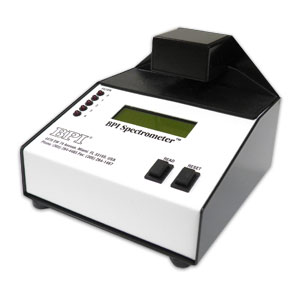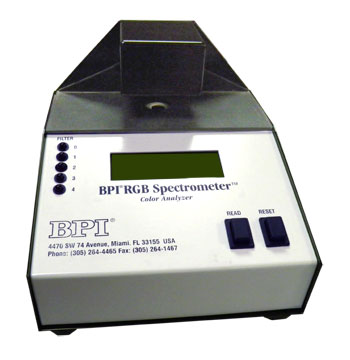|
|
Spectrometer™
PC: 119521 (110v) • 219524 (220v)
The BPI® Spectrometer™ covers wavelengths from 350nm to 710nm with a resolution of better than 10nm. The transmittance spectrum results may be used for quality control purposes, such as comparing tinted lenses as well as providing information about what tints need to be added to match the color of another lens or a customer-supplied sample spectrum. |
||
Lenses must be removed from frame. |
||
Lens clearance: 0.75in (2cm) |
||
Height: 5in (12.7cm) |
||
Width: 6.25in (15cm) |
||
Depth: 6.75in (17.2cm) |
||
Weight: 6lbs (2.72kg) |
||
Test range: 350 - 700nm |
||
Amperage: 1 amp |
||
Fuse: 1 amp/250v. |
||
Automatic calibration |
||
Display on unit: % transmission of UV, visible, red, yellow, green and blue. L*A*B* readings. European traffic signal standards indicator LED's. |
||
Set-up kit: Manual. Patient brochures and stand. CD-ROM with MS Windows format software. USB adapter cable. |
||
UL listed components. Meets/exceeds CE standards |
||
RGB Spectrometer™
PC: 19508 (110v) • 219523 (220v)
The BPI® RGB Spectrometer™ is a colorimeter: a device that analyzes color and describes it in terms of a mathematical model of human vision. It can be used by itself as a free-standing colorimeter, or it can be connected to the USB port of a PC (not included). |
||
Most lenses can be measured while in the frame. |
||
Lens clearance: 0.75in (2cm) |
||
Height: 5.9in (15cm) |
||
Width: 6.75in (17.2cm) |
||
Depth: 7.25in (18.5cm) |
||
Weight: 6lbs (2.72kg) |
||
Amperage: 1 amp |
||
Fuse: 1 amp/250v. |
||
Automatic calibration |
||
Display on unit: % transmission of visible, red, green and blue, CIE X, Y, Z; CIE L*A*B* readings. |
||
Set-up kit: Manual. CD-ROM with MS Windows format software. USB adapter cable. |
||
UL listed components. Meets/exceeds CE standards |
||
Call for pricing and availability. |
|
|
|
BPI® is the world’s largest manufacturer of optical tints that are used by opticians, optometrists and ophthalmologists in tinting, dying, or otherwise coloring clear plastic – especially optical sunglass lenses. BPI® also produces lines of therapeutic tints providing UV protection and aiding with problems such as blepharospasms, headaches, retinitis pigmentosa, color blindness, corneal dystrophys, macular degeneration, retinal damage and dyslexia. BPI® has specialty tints such as EVA for viewing computer monitors and Solar Dyes for the finest sunglasses. BPI® also manufactures laboratory equipment such as tinting instruments, photometers, ultrasonic cleaners, edgers (for edging lenses), gradient lensors (for producing gradation of tint on lenses) and ovens for heat and chemical tempering of glass lenses for safety glasses and eyewear. BPI® supports all optical lens and sunglass manufacturers and optical laboratories. Brain Power Inc, 4470 SW 74 Avenue, Miami Florida, 33155 • Telephone: 305-264-4465 • Toll Free: 1-800-225-5274 |
|---|
|
ALL PAGES WITHIN THIS WEBSITE ARE © 2006 BPI®. All specific names mentioned herein are trademarks of Brain Power Inc®. Miami. Florida. The following are registered trademarks with the US Patent Office and with similar offices in other countries: Transchromatic®, Solar Sun®, There isn’t a lens we can’t improve®, Safari®, Designed Spectrum®, Blue Barrier®, Brain Power Inc.®, BPI®, Buy now, save later®, Dye Hard®, EVA®, Spectracolor®, Safari®, Solar®, The Pill® and Ziptint®. The BPI® bottle shape and design are trademarks of BPI®. BPI® is not responsible for typographical errors. Offers subject to change without notice. Any prices quoted do not include sales tax or shipping charges. Item availability and price are subject to change without notice. |
|---|


